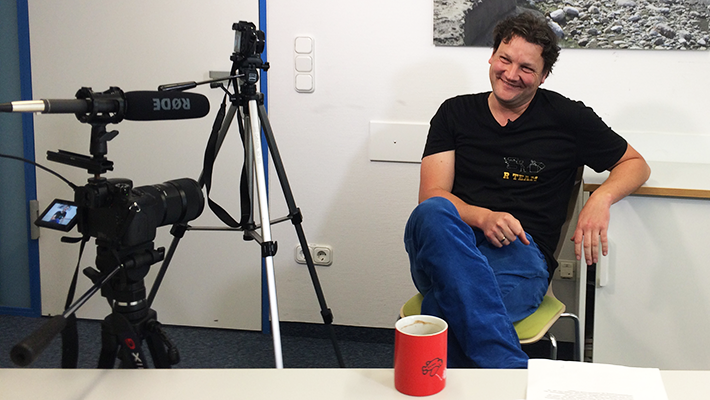The Island of Ruegen in northwest Germany is well known for its white chalk cliffs, the islands National Park Jasmund attracts numerous visitors each year. Again and again landslides come off the cliffs that endanger human life and force a regression of the coastline with an annual volume of material comparable to forty one family houses. A better understanding of the conditions that cause landslides can increase safety for the visitors as well as provide science with a better understanding of the natural prcesses behind these mass movements. Together with his team, Michael Dietze, GFZ section Geomorphology, investigates landslides processes at the chalk cliffs.
Therefore, the team installed a seismic network within the National Park that allows for a very detailed monitoring and localization of ground motions. Like this, it is possible to determine the exact timing of mass movements at the cliffs and the volume of the transported material. Meteorological stations serve for a relation of these events with the prevailing weather conditions during: Were landslides for example preceded by strong rainfall events? Kristen Cook, drone pilot within the project, furthermore adds to the project detailed periodic pictures of the terrain. In combination with ground-based photos these pictures allow for a verification of the seismic localizations and the generation of three-dimensional terrain models.
In our GFZ movie Michael Dietze talks about the project.
13.09.2017, Ariane Kujau
>>Link to the interview with drone pilot Kristen Cook








![[Translate to English:] Torsten Sachs in front of a climate station on a field](/fileadmin/_processed_/3/9/csm__TorstenSachs_bearbeitet_GS_4a1365ef84.jpeg)

![[Translate to English:] left image flood at the Ahrtal: image from above, several houses are flooded; left image:: Heidi Kreibich;](/fileadmin/_processed_/4/4/csm_Bild2_9af0130e9f.png)



![[Translate to English:] Start der Vega Rakete](/fileadmin/_processed_/6/4/csm_20231201-kachel_Vega-VV23-launch_ESA-CNES-Arianespace_706716b68c.jpeg)









![[Translate to English:] Poster exhibition at the Brandenburg Hydrogen Day at the GFZ, some participants in the foreground](/fileadmin/_processed_/6/5/csm_Erster_Brandenburgischer_Wasserstofftag_GFZ_402fcec95e.jpeg)
![[Translate to English:] Group picture of the participants](/fileadmin/_processed_/9/4/csm_20231108_CAWa-Workshop-Tashkent_Gruppenbild_99ea779d8a.jpeg)

![[Translate to English:] [Translate to English:] Hörsaal](/fileadmin/_processed_/e/6/csm_H%C3%B6rsal_e21ac645fb.jpeg)


![[Translate to English:] The Delegations in the Historic Library on the Telegrafenberg. In the back there are from left to right, the Dutch Ambassador for Germany, Ronald van Roeden, the Dutch Minister for Education, Culture and Science, Robbert Dijkgraaf and the scientific director of the GFZ, Susanne Buiter.](/fileadmin/_processed_/d/b/csm_Kachel-2_9eba4b4212.jpeg)

